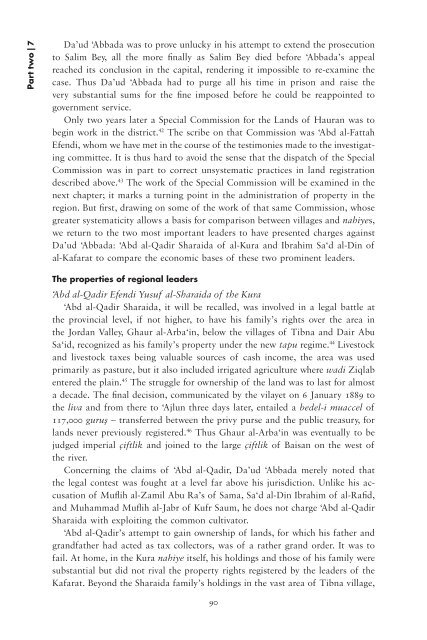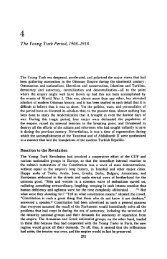Governing property, making the modern state - PSI424
Governing property, making the modern state - PSI424
Governing property, making the modern state - PSI424
You also want an ePaper? Increase the reach of your titles
YUMPU automatically turns print PDFs into web optimized ePapers that Google loves.
Part two | 7<br />
Da’ud ‘Abbada was to prove unlucky in his attempt to extend <strong>the</strong> prosecution<br />
to Salim Bey, all <strong>the</strong> more finally as Salim Bey died before ‘Abbada’s appeal<br />
reached its conclusion in <strong>the</strong> capital, rendering it impossible to re-examine <strong>the</strong><br />
case. Thus Da’ud ‘Abbada had to purge all his time in prison and raise <strong>the</strong><br />
very substantial sums for <strong>the</strong> fine imposed before he could be reappointed to<br />
government service.<br />
Only two years later a Special Commission for <strong>the</strong> Lands of Hauran was to<br />
begin work in <strong>the</strong> district. 42 The scribe on that Commission was ‘Abd al-Fattah<br />
Efendi, whom we have met in <strong>the</strong> course of <strong>the</strong> testimonies made to <strong>the</strong> investigating<br />
committee. It is thus hard to avoid <strong>the</strong> sense that <strong>the</strong> dispatch of <strong>the</strong> Special<br />
Commission was in part to correct unsystematic practices in land registration<br />
described above. 43 The work of <strong>the</strong> Special Commission will be examined in <strong>the</strong><br />
next chapter; it marks a turning point in <strong>the</strong> administration of <strong>property</strong> in <strong>the</strong><br />
region. But first, drawing on some of <strong>the</strong> work of that same Commission, whose<br />
greater systematicity allows a basis for comparison between villages and nahiyes,<br />
we return to <strong>the</strong> two most important leaders to have presented charges against<br />
Da’ud ‘Abbada: ‘Abd al-Qadir Sharaida of al-Kura and Ibrahim Sa‘d al-Din of<br />
al-Kafarat to compare <strong>the</strong> economic bases of <strong>the</strong>se two prominent leaders.<br />
The properties of regional leaders<br />
‘Abd al-Qadir Efendi Yusuf al-Sharaida of <strong>the</strong> Kura<br />
‘Abd al-Qadir Sharaida, it will be recalled, was involved in a legal battle at<br />
<strong>the</strong> provincial level, if not higher, to have his family’s rights over <strong>the</strong> area in<br />
<strong>the</strong> Jordan Valley, Ghaur al-Arba‘in, below <strong>the</strong> villages of Tibna and Dair Abu<br />
Sa‘id, recognized as his family’s <strong>property</strong> under <strong>the</strong> new tapu regime. 44 Livestock<br />
and livestock taxes being valuable sources of cash income, <strong>the</strong> area was used<br />
primarily as pasture, but it also included irrigated agriculture where wadi Ziqlab<br />
entered <strong>the</strong> plain. 45 The struggle for ownership of <strong>the</strong> land was to last for almost<br />
a decade. The final decision, communicated by <strong>the</strong> vilayet on 6 January 1889 to<br />
<strong>the</strong> liva and from <strong>the</strong>re to ‘Ajlun three days later, entailed a bedel-i muaccel of<br />
117,000 guruş – transferred between <strong>the</strong> privy purse and <strong>the</strong> public treasury, for<br />
lands never previously registered. 46 Thus Ghaur al-Arba‘in was eventually to be<br />
judged imperial çiftlik and joined to <strong>the</strong> large çiftlik of Baisan on <strong>the</strong> west of<br />
<strong>the</strong> river.<br />
Concerning <strong>the</strong> claims of ‘Abd al-Qadir, Da’ud ‘Abbada merely noted that<br />
<strong>the</strong> legal contest was fought at a level far above his jurisdiction. Unlike his accusation<br />
of Muflih al-Zamil Abu Ra’s of Sama, Sa‘d al-Din Ibrahim of al-Rafid,<br />
and Muhammad Muflih al-Jabr of Kufr Saum, he does not charge ‘Abd al-Qadir<br />
Sharaida with exploiting <strong>the</strong> common cultivator.<br />
‘Abd al-Qadir’s attempt to gain ownership of lands, for which his fa<strong>the</strong>r and<br />
grandfa<strong>the</strong>r had acted as tax collectors, was of a ra<strong>the</strong>r grand order. It was to<br />
fail. At home, in <strong>the</strong> Kura nahiye itself, his holdings and those of his family were<br />
substantial but did not rival <strong>the</strong> <strong>property</strong> rights registered by <strong>the</strong> leaders of <strong>the</strong><br />
Kafarat. Beyond <strong>the</strong> Sharaida family’s holdings in <strong>the</strong> vast area of Tibna village,<br />
90












